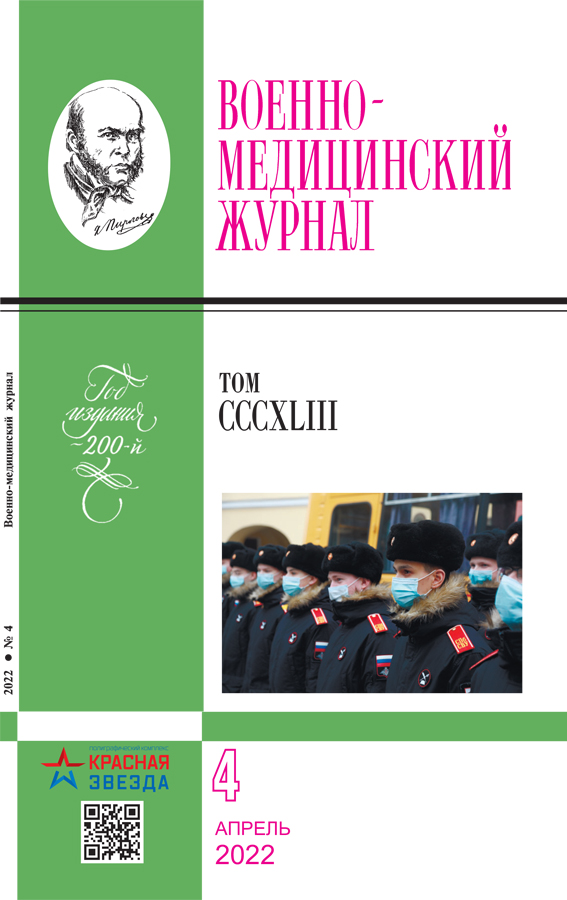Военно-биологический аспект изучения генотипов человека на примере COVID-19
- Авторы: Супотницкий М.В.1
-
Учреждения:
- ФГБУ «27 Научный центр» МО РФ
- Выпуск: Том 343, № 4 (2022)
- Страницы: 40-44
- Раздел: Эпидемиология и инфекционные болезни
- URL: https://journals.eco-vector.com/0026-9050/article/view/629715
- DOI: https://doi.org/10.52424/00269050_2022_343_4_40
- ID: 629715
Цитировать
Аннотация
Цель исследования состояла в оценке данных изучения генотипов людей в качестве основы для ведения против них биологической войны. Использовались материалы открытых научных публикаций. Анализировались эпидемиология, клиника и исходы на примере COVID-19 у людей различных генотипов. Рассмотрены возможности обратной генетики по конструированию коронавирусов с измененной специфичностью и «новыми функциями». Установлено, что степень тяжести течения COVID-19 зависит, в основном, от генов, определяющих факторы иммунного ответа хозяина на вирус, в то время как разная восприимчивость людей к SARS-CoV-2 в основном связана с вариантами генов, кодирующих поверхностные рецепторы и имеющих отношение к начальной стадии инфекции.
Ключевые слова
Об авторах
М. В. Супотницкий
ФГБУ «27 Научный центр» МО РФ
Автор, ответственный за переписку.
Email: 27nc_1@mil.ru
полковник медицинской службы в отставке
Россия, МоскваСписок литературы
- Anastassopoulou C., Gkizarioti Z., Patrinos G.P., Tsakris A. Human genetic factors associated with susceptibility to SARS-CoV-2 infection and COVID-19 disease severity // Hum. Genomics. – 2020. – Vol. 14, N 1. – P. 40. https://doi.org/10.1186/s40246-020-00290-4
- Cheng H., Wang Y., Wang G.-Q. Organ-protective effect of angiotensin-converting enzyme 2 and its effect on the prognosis of COVID-19 // J. Med. Virol. – 2020. – Vol. 92, N 7. – P. 726–730. https://doi.org/10.1002/jmv.25785
- Elhabyan A., Elyaacoub S., Sanad T. et al. The role of host genetics in susceptibility to severe viral infections in humans and insights into host genetics of severe COVID-19: A systematic review // Virus Res. – 2020. – Vol. 289. – P. 198163. https://doi.org/10.1016/j.virusres. 2020.198163
- Hou Y., Zhao J., Martin W. et al. New insights into genetic susceptibility of COVID-19: an ACE2 and TMPRSS2 polymorphism analysis // BMC Med. – 2020. – Vol. 18. – P. 216. https://doi.org/10.1186/s12916-020-01673-z
- Millett G.A., Jones A.T., Benkeser D. et al. Assessing Differential Impacts of COVID-19 on Black Communities // Ann. Epidemiol. – 2020. – Vol. 44. https://doi.org/10.1016j.annepidem. 2020.05.003
- Pana D., Szec S., Minhasc J.S. et al. The impact of ethnicity on clinical outcomes in COVID-19: A systematic review // Clin. Medicine. – 2020. – Vol. 23. – P. 100404. https://doi.org/10.1016/j.eclinm.2020.100404
- Pickard A., Calverley B., Chang J. et al. Discovery of re-purposed drugs that slow SARS-CoV-2 replication in human cells // PLoS Pathog. – 2021. – Vol. 17, N 9. – e1009840. https://doi.org/10.1371/journal.ppat.1009840
- Ren W., Zhu Y., Lan J. et al. Susceptibilities of Human ACE2 Genetic Variants in Coronavirus Infection // J. Virol. – 2022. – Vol. 96, N 1. – e01492-21. https://doi.org/10.1128/JVI.01492-21
- Rihn S., Merits A., Bakshi S. et al. A plasmid DNA-launched SARS-CoV-2 reverse genetics system and coronavirus toolkit for COVID-19 research // PLoS Biol. – 2021. – Vol. 19, N 2. – e3001091. https://doi.org/10.1371/journal. pbio.3001091
- Thao T.T.N., Labroussaa F., Thiel V. Rapid reconstruction of SARS-CoV-2 using a synthetic genomics platform // Nature. – 2020. – Vol. 582. – P. 561–565. https://doi.org/10.1038/s41586-020-2294-9
- Vepa A., Bae J.P., Ahmed F. et al. COVID-19 and ethnicity: A novel pathophysiological role for inflammation // Diabetes Metab. – 2020. – Vol. 14, N 5. – P. 1043–1051. https://doi.org/10.1016/j.dsx.2020.06.056
- Xie X., Lokugamage K.G., Zhang X. et al. Engineering SARS-CoV-2 using a reverse genetic system // Nat. Protoc. – 2021. – Vol. 16, N 3. – P. 1761–1784. https://doi. org/10.1038/s41596-021-00491-8
- Xie X., Muruato A., Lokugamage K.G. et al. An infectious cDNA clone of SARS-CoV-2 // Cell. Host. Microbe. – 2020. – Vol. 27, N 5. – P. 841–848. https://doi.org/10.1016/j.chom. 2020.04.004
- Ye Ch., Chiem K., Park J.-G. et al. Rescue of SARS-CoV-2 from a single bacterial artificial chromosome // mBio. – 2020. – Vol. 11, N 5. – e02168-20. https://doi.org/10.1128/ mBio.02168-20
Дополнительные файлы







